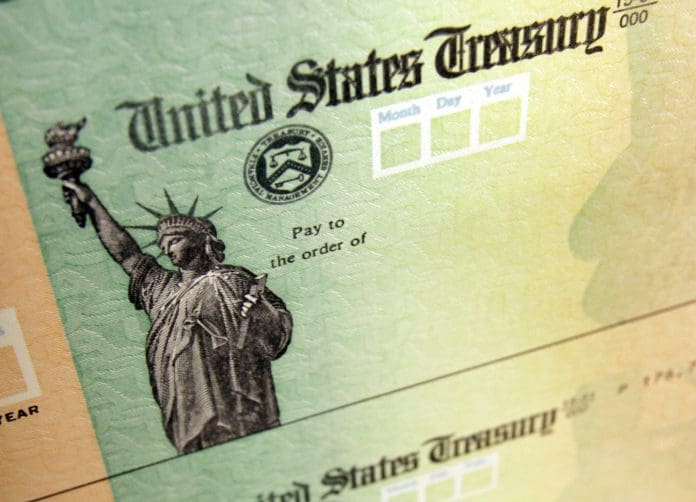The series of stimulus checks and other relief packages sent money directly to Americans during the pandemic. It was the biggest-ever exercise in direct funding that was supplemented by a greatly expanding unemployment coverage and made a number of other changes.
The stimulus checks began a tax too late for many as President Trump hemmed and hawed for weeks before the truth hit home. By the time he declared an emergency and ordered a shutdown, the pandemic had already spread into the heart of America.
No amount of blaming foreign countries could cover up for the gross mismanagement of the Republican administration led by Donald Trump. And when it finally arrived the virus had already pushed the economy towards a severe recession as the nation shut down for weeks.
Three stimulus checks and a host of other support measures later, Americans continue to face tough economic conditions. The pandemic was followed by a deep recession that gave way to record inflation that saw prices shoot up, starting in the last quarter of 2021.
Whatever the reason behind it, the pandemic was one major reason. The pandemic disrupted the world economy first by totally shutting down the economy for a prolonged period and subsequently disrupting the supply-demand equation. These together combined to push up prices across products and services.
The prices of products from gasoline to groceries kept increasing throughout 2022 as inflation beat 4-decade-old records.
The federal administration had enhanced the unemployment check payments as a supplement to the economic impact payments. The plan pulled in far more workers than are eligible for unemployment payments under normal circumstances.
For the pandemic stimulus checks they included part-time workers and self-employed people. For the pandemic, the benefits were generous and included those who are unemployed, were partially employed, or cannot work for a variety of coronavirus-related reasons. These people were more likely to get pandemic-related benefits.
People who lost the breadwinner of their household as a result of COVID-19 and relief on that person for income were eligible for the repayments.
Though Wildly Popular We May Have Seen The End Of Stimulus Checks
The stimulus checks that were sent during the pandemic and later during the economic downturn were wildly successful in their purpose of staving immediate starvation and homelessness. Initially, it received bipartisan support from the Democrats and the Republicans though the latter later choose to step back once they were out of power.
so despite the wild popularity, the stimulus checks were not without controversy.
Some of the criticism faced by the stimulus check, especially the third round, was that it was not targeted correctly and that there were too many rounds of payments. They should also have been better targeted to financially struggling Americans.
Another frequent criticism centers around the allegation that the cash caused runaway inflation this year.
Despite criticism the success of the stimulus checks along with the expanded Child Tax Credit meant that they are likely to become a tool that the government will repeat in the future during similar emergencies.
It has been more than 15 months since the final round of the stimulus check was issued. But the funds under the Rescue Plan have financed a major part of the inflation relief stimulus checks in many states.
People Resort To Innovative And Time-Tested Ways To Stay Solvent
The end of stimulus checks has made it difficult to manage home budgets. But people are resorting to innovative methods to manage their spending even as the cost-of-living crisis bites. In an age of seamless access to digital payment methods, cash is making a comeback, thanks to the rising cost of living.
Surveys conducted showed that 53% of adults in the US and 46% in the UK use cash more now than a year ago. In the US it is an unprecedented 19% more. Approximately 3 in 5 cash users said that the use of physical money was making them spend less.
The reversing preferences are to a certain extent a reaction to the proliferation of digital methods of payment – from Venmo to Google Pay to touchless cards. Consumers realized that it is too easy to exceed the budget. Many consumers admitted that such payment methods made them spend more than necessary, a dangerous trend in the absence of the stimulus check.
Now younger people are turning to “cash-stuffing,” a trend embodied by the success achieved by a Texas woman. Jasmine Taylor paid off nearly $70,000 in debts within a year and turned the method into a hugely successful business.
Consumers are also pushing back against businesses that do not accept cash. People who had been living paycheck to paycheck admit that they have made substantial savings after they switched over to using cash.
The discipline was a result of creating accountability for every penny spent and maintaining visual budget records. Budgeting was something that many people had never done before.
The underground economy of paying in cash to avoid tax grew during the pandemic and the high increase in the use of cash reflects that. Economists estimate that this part of the economy accounts for as much as ten percent of the US gross domestic product. It is even more in Europe.
This trend towards cash is not just a temporary move induced by the end of the pandemic and the stimulus checks. There has been a sustained recovery in cash use since the pandemic and banknotes in circulation remain at a historic high.
Low and moderate-income households report high use of cash as they struggle to navigate soaring costs for everything from milk to mortgages.
The resurgence in the use of cash is inextricably linked to how well the Federal Reserve succeeds in taming the persistently high inflation. Finance companies have realized that they are losing out on business and have adapted by introducing features that help customers set limits on spending.
Finance companies have introduced systems that alert you when you are about to make a purchase in a budget category.
With both federal and state governments moving away from stimulus check support to Americans, people have realized the importance on cutting down on spending during a recessionary period. And even as inflation remains high, Americans are racking up debt and burning through their savings. This could lead to another recession warn economists.






